|
|
|
Sort Order |
|
|
|
Items / Page
|
|
|
|
|
|
|
| Srl | Item |
| 1 |
ID:
159558
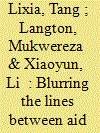

|
|
|
|
|
| Summary/Abstract |
Chinese Agriculture Technology Demonstration Centres (ATDC) in Africa are designed to be aid programmes managed by business-driven entities to operate into the future without requiring subsidies from the Chinese government. Such an arrangement requires Chinese staff to perform dual roles as aid workers and businesspeople. This leads to blurred identities and roles among Chinese actors, and misunderstandings among local Zimbabwean partners. The blurred line between aid and business has created misperceptions and tensions among the different actors. Nonetheless, the ATDCs offer an alternative model of aid that deserves further empirical examination.
|
|
|
|
|
|
|
|
|
|
|
|
|
|
|
|
| 2 |
ID:
159563


|
|
|
|
|
| Summary/Abstract |
This article analyses the impact of China's outward foreign direct investment (OFDI) to 48 "One Belt, One Road" (OBOR) countries on the extensive and intensive margins of trade using Chinese OFDI data from 2004 to 2014. The study yields the following key findings. First, Chinese OFDI exerts a trade creation instead of a trade substitution effect on total export volumes. Second, in terms of the technological sophistication of exports, Chinese OFDI has a notable effect in boosting exports with low or medium levels of technological content. Finally, there is no strong evidence that Chinese OFDI significantly expands the number of export product categories. These findings imply that the trade creation effect of Chinese OFDI derives mainly from increases in the intensive rather than the extensive margin of trade.
|
|
|
|
|
|
|
|
|
|
|
|
|
|
|
|
| 3 |
ID:
159564
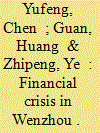

|
|
|
|
|
| Summary/Abstract |
Few studies have focused on the evaluation of China's "four trillion yuan economic package" promulgated in 2008, especially its negative effects. This article seeks to verify a hypothesis that the financial crisis in Wenzhou between 2011 and 2014 was an unanticipated consequence of the "four trillion yuan economic package". By using the Austrian business cycle theory, the authors attempt to identify the causal mechanisms of the Wenzhou financial crisis. They obtained the following findings: First, the tremendous credit expansion accompanying the "four trillion yuan economic package" distorted interest rate signals and the production structure, eventually leading to the financial crisis in Wenzhou. Second, the industrial policy accompanying the "four trillion yuan economic package" and relations-based governance in Wenzhou strengthened the above causal effect at the national and regional levels. This article unravels the black box of the Wenzhou financial crisis and sheds light on the policy evaluation literature on massive government intervention in China.
|
|
|
|
|
|
|
|
|
|
|
|
|
|
|
|
| 4 |
ID:
159562


|
|
|
|
|
| Summary/Abstract |
China's search for energy security has attracted growing research interest over the past decade, where the main focus has been on both China's ability to meet its daunting oil requirements and the effects that its consumption and quest for oil abroad has on global energy security. This article attempts to explain China's state-led approach to energy security and evaluate its effectiveness. In doing so, it provides a counter-argument to the conventional scholarly view that China suffers from a dearth of oil state capacity. This prevailing view is informed by an influential, yet arguably outdated, model of the Chinese policy process called fragmented authoritarianism (FA). An alternative model, known as bureaucratic authoritarianism (BA), is shown to provide a more compelling explanation of the interplay of elite and bureaucratic power within the oil sector. It acknowledges that the central Party-state is defined by a steep power gradient, which has been strengthened in recent years, especially in the strategic sectors of the Chinese economy (oil sector is at the forefront). A more optimistic appraisal of China's oil state capacity that traces institutional change throughout the reform era, it shows that capacity has improved over time, as is reflected in better policy outcomes.
|
|
|
|
|
|
|
|
|
|
|
|
|
|
|
|
| 5 |
ID:
159561
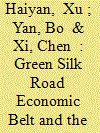

|
|
|
|
|
| Summary/Abstract |
Central Asia has a fragile ecological environment. In particular, one of the most challenging environmental concerns in the region is the Aral Sea crisis. Despite the global attention received on the governance of the Aral Sea, the crisis remains unresolved. This article presents a novel conceptual framework and dynamic model for the governance of the Aral Sea. The authors suggest that a key aspect of agricultural modernisation in Central Asia should entail returning water to the Aral Sea to gradually ease the Aral Sea crisis. The authors argue that China's recent proposal to construct a Silk Road Economic Belt provides an opportunity for initiating effective water governance of the Aral Sea, as corroborated in their framework and model. The authors recommend the development of a "green Silk Road Economic Zone" as a cooperative and sustainable joint initiative of the countries concerned that would benefit Central Asia and China, as well as the Aral Sea.
|
|
|
|
|
|
|
|
|
|
|
|
|
|
|
|
| 6 |
ID:
159560
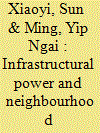

|
|
|
|
|
| Summary/Abstract |
This article examines the capacity of China to adapt in the face of the political and social challenges brought about by economic reforms, and argues that the regime's resilience lies in the state's capacity to establish infrastructural power at the urban grass-roots level. The 1980s was an invaluable historical period, which witnessed the early stages of the economic reforms and the Chinese state experimenting with ways to adapt to the emerging challenges. As the danwei (work unit) system weakened, the state rebuilt the logistical infrastructure by means of handling burning issues, accumulating resources for expanding welfare coverage, facilitating residential-based grass-roots administrative networks, and consolidating its power through building institutional infrastructure for urban governance.
|
|
|
|
|
|
|
|
|
|
|
|
|
|
|
|
| 7 |
ID:
159557
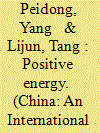

|
|
|
|
|
| Summary/Abstract |
Scholarship to date agrees that the internet has weakened the Chinese Party-state's ideological and discursive hegemony over society. This article documents a recent intervention into public discourse exercised by the Chinese state through appropriating and promoting a popular online catchphrase—"positive energy" (zheng nengliang). Analysing the "positive energy" phenomena using Laclau and Mouffe's theory of hegemony and discourse, the authors argue that the relative effectiveness of this hegemonic intervention rests on the semantic versatility of "positive energy", which enables "chains of equivalence" to be established between the label's popular meanings, on the one hand, and its propagandist meanings, on the other.
|
|
|
|
|
|
|
|
|
|
|
|
|
|
|
|
| 8 |
ID:
159559


|
|
|
|
|
| Summary/Abstract |
Despite the amount of research indicating the growing success of China's "soft power" in the developing world, few theoretically informed discussions explain its soft power influence. Using Robert Cox's critical theory of international relations, this article contends that China has co-opted the future elites of the peripheral world to decrease the "China threat" argument. Through a survey of China Scholarship Council (CSC) recipients from 2009 to 2015, the authors' findings show that the CSC has played a considerable role in the socialisation of its soft power to reduce less developed countries' fear of a revisionary China.
|
|
|
|
|
|
|
|
|
|
|
|
|
|
|
|
|
|
|
|
|